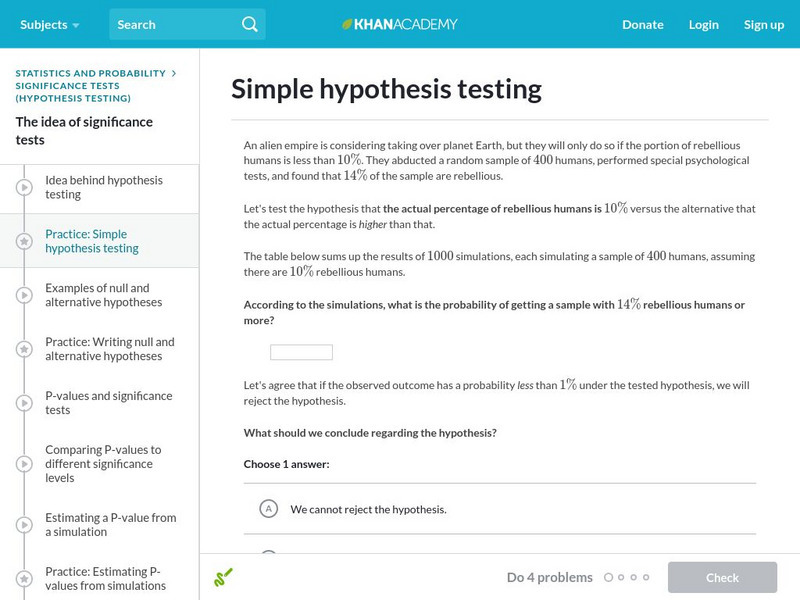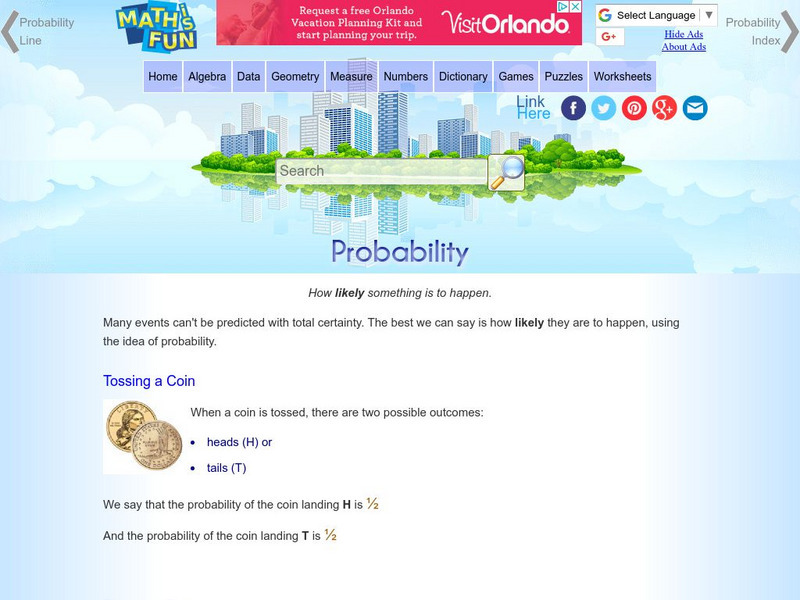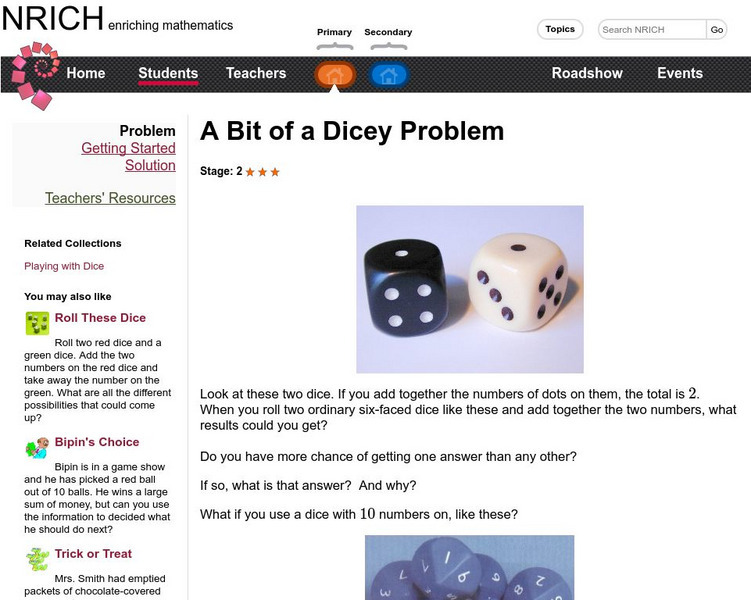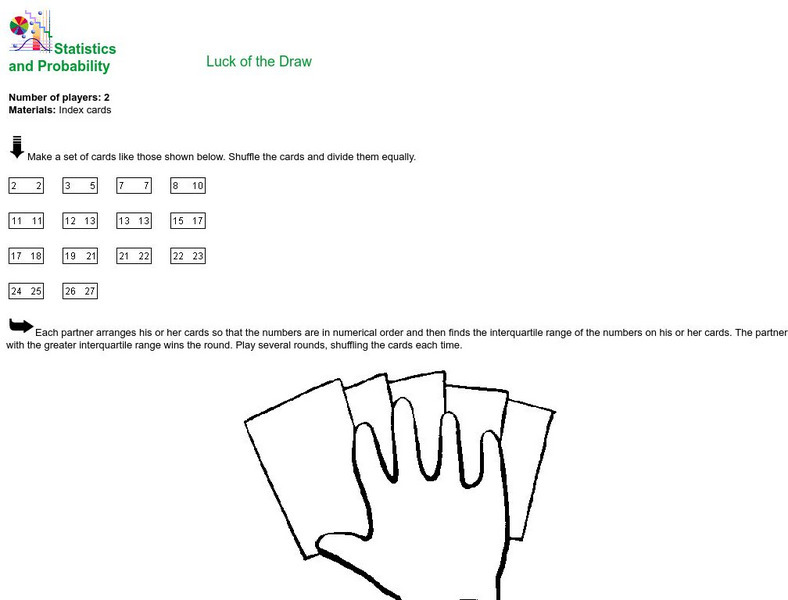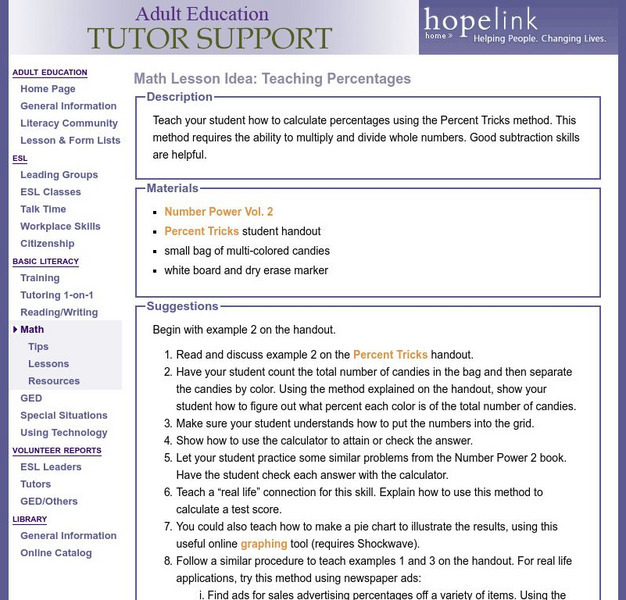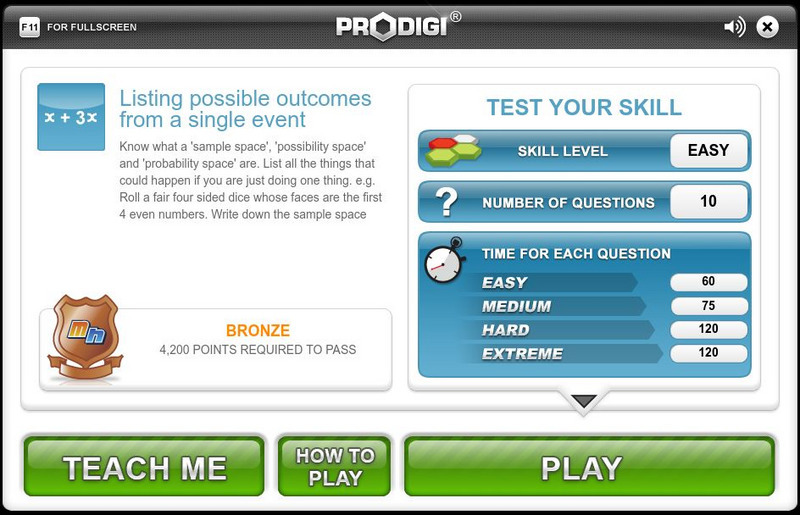McGraw Hill
Glencoe: Self Check Quizzes 2 Simple Events
Use Glencoe's Math Course 2 randomly generated self-checking quiz to test your knowledge of the probability of outcomes for simple events. Each question has a "Hint" link to help. Choose the correct answer for each problem. At the bottom...
McGraw Hill
Glencoe Mathematics: Online Study Tools: Probability of Simple Events
This site gives a short interactive quiz which allows students to self-assess their understanding of the concept of the probability of simple events.
Khan Academy
Khan Academy: Theoretical and Experimental Probability: Coin Flips and Die Rolls
A set of questions on experimental and theoretical probabilities using coins and dice. Answers are accompanied by explanations.
Khan Academy
Khan Academy: Simple Hypothesis Testing
Show that you have mastery over the idea behind hypothesis testing by calculating some probabilities and drawing conclusions. Students receive immediate feedback and have the opportunity to try questions repeatedly, watch a video or...
PBS
Pbs: The Lowdown: Your Odds of Winning Powerball: Probabilities of Compound Events Using Visuals
In this video, explore the odds of winning the Powerball lottery and learn what few people realize about their chances of winning: they are miniscule. In the accompanying classroom activity, students create simple lottery models to help...
Math Is Fun
Math Is Fun: Probability
Explains what probability and outcomes are. Presents a formula for calculating probability for a simple dice or marble experiment. Introduces the concept of a probability line and discusses vocabulary used to talk about probability....
University of Cambridge
University of Cambridge: Maths and Sports: Arsenal Collection: Football Formations
How many different football team formations can you find? This activity provides an engaging real-life context to investigate simple combinations, and is aimed at Key Stage 3 students.
Better Lesson
Better Lesson: Playing With Probability Some Simple Scenarios
Exposure to this concept now is both fun and engaging AND a crucial step toward building a foundation for deeper, long-term understanding.
Annenberg Foundation
Annenberg Learner: Math in Daily Life: Playing to Win
A simple explanation of the link between math and winning odds at a casino. Learn about determining probability through two examples and about other ways we "play the odds" in real life. A second part of this article, "Place Your Bets:...
Oswego City School District
Regents Exam Prep Center: Set Builder and Interval Notation
Use this lesson, practice exercise, and teacher resource when planning instruction on sets and interval notation. Offers simple definitions and examples, an eleven-question online quiz, and a .pdf worksheet for students to complete while...
National Council of Teachers of Mathematics
Nctm: Figure This: Vcr
This resource presents an interesting challenge for the serious mathematician with strong reasoning skills. Explore proportional reasoning, probabilities, fractions, and ratios in this challenge to figure out if you always get six hours...
National Council of Teachers of Mathematics
The Math Forum: The Cereal Box Problem
A cereal company is offering six different prizes in their boxes. How many boxes would you expect to have to purchase in order to collect all six prizes? Known as the Cereal Box Problem, this question is explored here. A solution is...
University of Cambridge
University of Cambridge: Nrich: A Bit of a Dicey Problem
Short website offers a look into the theoretical probability of tossing dice. Several questions related to the throwing of dice are included.
University of Cambridge
University of Cambridge: Nrich: In a Box
This probability problem encourages the learner not only to arrive at a solution, but also to defend it.
McGraw Hill
Mc Graw Hill Education: Glencoe: Statistics and Probability: Luck of the Draw
Instructions for creating and playing a simple card game through which students can practice calculating the interquartile range from a set of numbers.
Oswego City School District
Regents Exam Prep Center: Mutually Exclusive & Independent Events
The somewhat tricky differences between mutually exclusive, non-mutually exclusive, independent, and dependent events are defined here. Common items such as coins, colored cubes, and a deck of cards are all part of the easy-to-understand...
Hopelink
Hopelink: Teaching Percentages
Students can brush up on percentage skills with this lesson and calculate percentages using the "Percent Tricks method." For students to successfully use this method, they must have the ability to multiply and divide whole numbers.
Ministry of Education and Universities of the Region of Murcia (Spain)
Ministerio De Educacion Y Ciencia: El Juego De Vida
Find out how from simple rules and structures you can obtain complex and unexpected results. Enjoy the games.
Mangahigh
Mangahigh: Data: Listing Possible Outcomes From a Single Event
Students learn about the concept of outcomes by exploring a tutorial. They can then test their knowledge by taking a ten question assessment that increases in difficulty as they correctly answer questions.





